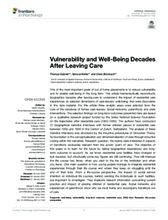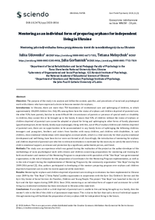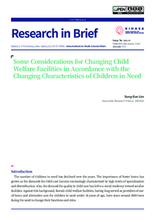Displaying 161 - 170 of 1510
This article hermeneutically reconstructs biographies decades after leaving-care to understand the impact of residential care experiences on selected dimensions of care-leavers’ well-being, that were discovered in the data material.
The present paper emphasizes on the trends of institutional care in India where the large population is poor. Keeping in view the socio-economic conditions of the country, it is an attempt to explore the challenges and living conditions of children in institutional care run by government and non-governmental organizations in the regions of Punjab and Chandigarh in northern India.
The aim of this study was to examine whether 1) attachment to the biological parents mediates the association between abuse and suicidal risk (SR) and 2) attachment to a foster parent (whether from a foster home or an institution) moderates the effect of attachment to biological parents on SR.
The aim of the current paper is to examine the demographic, crime-related and psychosocial characteristics of child welfare and juvenile justice youths in shared residential care and subsequently examine its relationship with offending behavior in adulthood.
The two primary objectives of this study were 1) to compare recent child abuse (physical, emotional, and sexual) between orphaned and separated children and adolescents’ (OSCA) living in institutional environments and those in family-based care; and 2) to understand how recent child abuse among street-connected children and youth compared to these other vulnerable youth populations.
The authors of this study used data from a longitudinal randomized controlled trial of foster care for institutionally reared children to examine whether caregiving quality and stressful life events (SLEs) in early adolescence (age 12) influence patterns of hypothalamic–pituitary–adrenal (HPA) axis and sympathetic nervous system (SNS) reactivity.
The purpose of the study is to analyze and define the content, specifics, and procedures of social and psychological work with citizens who have expressed a desire to become mentors for orphans.
This paper explores Lagos private schools as crucial sites of care for children with parents in the diaspora.
This brief discusses ways in which the roles and functions of Korea’s child welfare facilities should change to better meet the diverse needs of children in need.
This study aims to explore the experiences of Ghanaian care leavers to discern the factors that promote and impede their educational attainment.



